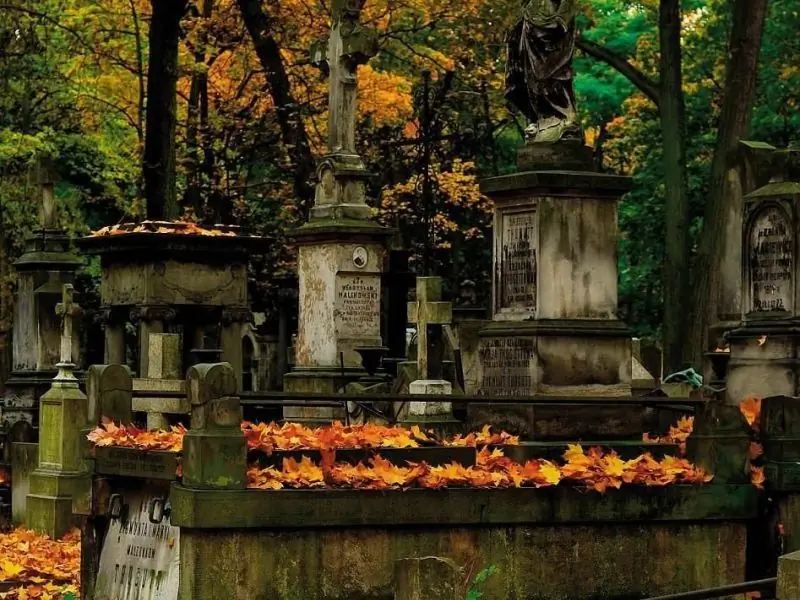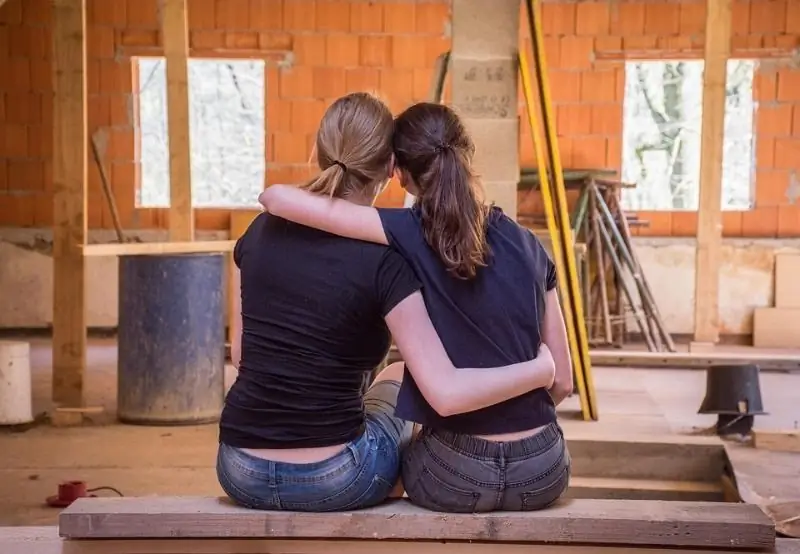
Table of contents:
- Author Bailey Albertson [email protected].
- Public 2023-12-17 12:53.
- Last modified 2025-01-23 12:41.
Why you can't fall into a cemetery: a logical explanation and signs

The resting places are surrounded by special mystery. There are also many superstitions associated in one way or another with being in a cemetery. Our grandmothers also believed that we should not fall and even stumble in the cemetery, inspiring us to go to our native graves slowly, without fuss, carefully and looking at our feet.
Signs and superstitions
If a person stumbled on the way to the grave of a loved one, it is worth considering whether something important has been forgotten that needed to be brought, the ancestors believed. So the soul of the deceased tries to say about it or warn that one should be more careful. Perhaps there is a huge puddle ahead, a ditch dug by someone, a bag of rubbish thrown on the path, about which you can get hurt.
Having fallen into the cemetery, a person should think about why the souls of relatives or friends do not want to let him go to the place of rest. This is one of the strongest signs warning that at this moment the road to the grave of the fallen is closed. There is no need to resist and continue the path if there is no great need for it. It is best to read the prayer three times, turning to the guardian angel for protection, return home, wash your face and hands with holy water, and then wash the soles of the shoes in which you walked. On this day, you can go to the temple, light a candle for peace, pray in silence for the soul of the deceased. The visit to the grave can be postponed for other days.
Having stumbled before leaving the cemetery, look at the grave of the deceased, ask him to answer why the soul does not let the living go. Check if the fence is closed, if everything brought is left on the grave or a table near it, if the garbage is removed.

Fall is a warning of impending danger. The souls of the dead are most likely trying to warn of a whole series of troubles, illnesses, and malicious intent. You should not treat this sign with disdain: after leaving the fence of the cemetery, wash your face and hands with prayer, best of all in running water. Thoroughly clean your shoes from the cemetery soil, with it you can bring trouble into the house. And when you return, rinse your face with holy water, light candles near the icons and ask for the protection of the saints.
Seeing someone off on their last journey and stumbling, a person must remember whether he fulfilled all the promises to the deceased, whether there were any debts or unforgiven grudges left. Having fallen, it is better not to continue the journey, the deceased does not want to see a person near his grave. After asking forgiveness or fulfilling promises, ordering a funeral service in the church, you can come to the grave in a few days. If there are no reasons for the anger of the deceased, then the fallen should accept the warning with gratitude and be more attentive - there are probably problems ahead that can be avoided.

Logical explanation of the ban
We stumble, hurrying and not looking at the road under our feet. This can explain the sign: remembering the deceased, there is no need to rush and fuss, stare around, think about business. We are going to honor the memory of the deceased, and this must be remembered all the time. As in ancient times, so now, there may be sharp rusty pieces of iron from monuments and fences, glass containers on the paths, which can be injured.
And it's not even worth talking about the danger of falling into the failed old graves. A person who died from a dangerous contagious disease, the pathogens of which sometimes end up on the surface of the soil, can be buried in the cemetery. Falling near such a grave, you can breathe in the spores of fungi or bacteria, carry them away on your hands or clothes. Perhaps that is why, after the fall of the grandmother, they were obliged to wash the hands and face of the saint, rich in silver, with water.

Superstitions can seem ridiculous. But many of us believe in omens and try to take into account the experience passed on by our ancestors in the form of certain prohibitions. And most of the so-called superstitions are based on logical explanations that remain relevant today.
Recommended:
Why You Can't Why You Can't Wash Floors On Friday: Signs And Facts

Why you can't wash floors on Friday: signs and superstitions. The opinion of the mystics and Orthodoxy
Why Millet Is Poured Into The Cemetery: Signs, Superstitions And Facts

Why do they pour millet on the graves in the cemetery? Signs and superstitions associated with custom
Why You Can't Pick Mushrooms And Berries In The Cemetery: Signs And Facts

Why you can't pick mushrooms and berries in the cemetery. Signs and superstitions. Logical explanation of the ban
Why You Can't Cry In A Cemetery: Signs And Facts

Why you can't cry in a cemetery: superstitions, logical explanation and opinion of the church
What Are The Signs To Understand That You Are A Real Friend, With Whom You Can Go Into Fire And Into Water

How to understand that you have a real friend who will not leave in trouble
